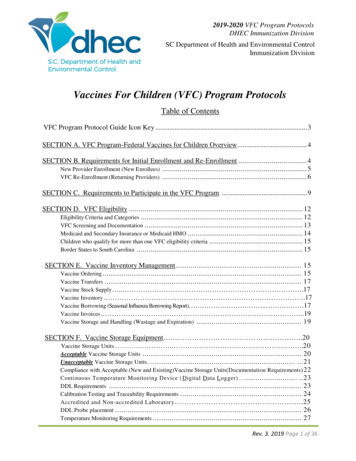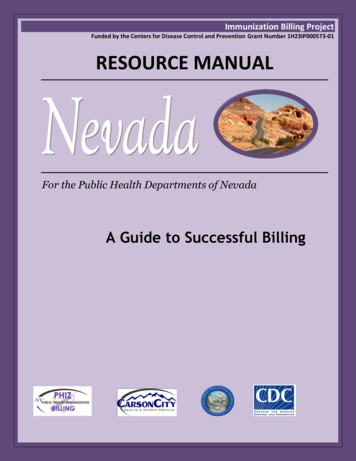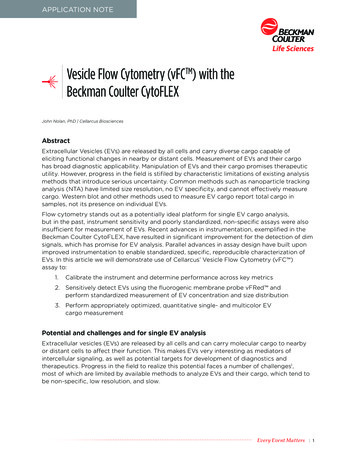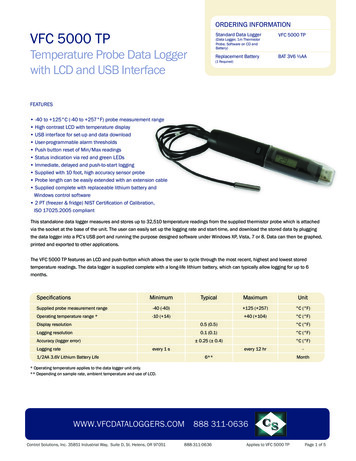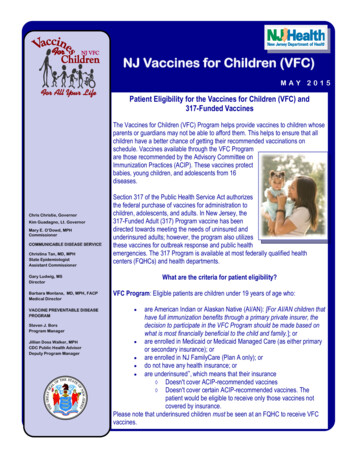
Transcription
NJ Vaccines for Children (VFC)MAY 2015Patient Eligibility for the Vaccines for Children (VFC) and317-Funded VaccinesThe Vaccines for Children (VFC) Program helps provide vaccines to children whoseparents or guardians may not be able to afford them. This helps to ensure that allchildren have a better chance of getting their recommended vaccinations onschedule. Vaccines available through the VFC Programare those recommended by the Advisory Committee onImmunization Practices (ACIP). These vaccines protectbabies, young children, and adolescents from 16diseases.Chris Christie, GovernorKim Guadagno, Lt. GovernorMary E. O’Dowd, MPHCommissionerCOMMUNICABLE DISEASE SERVICEChristina Tan, MD, MPHState EpidemiologistAssistant CommissionerSection 317 of the Public Health Service Act authorizesthe federal purchase of vaccines for administration tochildren, adolescents, and adults. In New Jersey, the317-Funded Adult (317) Program vaccine has beendirected towards meeting the needs of uninsured andunderinsured adults; however, the program also utilizesthese vaccines for outbreak response and public healthemergencies. The 317 Program is available at most federally qualified healthcenters (FQHCs) and health departments.What are the criteria for patient eligibility?Gary Ludwig, MSDirectorBarbara Montana, MD, MPH, FACPMedical DirectorVACCINE PREVENTABLE DISEASEPROGRAMSteven J. BorsProgram ManagerJillian Doss Walker, MPHCDC Public Health AdvisorDeputy Program ManagerVFC Program: Eligible patients are children under 19 years of age who:are American Indian or Alaskan Native (AI/AN): [For AI/AN children thathave full immunization benefits through a primary private insurer, thedecision to participate in the VFC Program should be made based onwhat is most financially beneficial to the child and family.]; or are enrolled in Medicaid or Medicaid Managed Care (as either primaryor secondary insurance); or are enrolled in NJ FamilyCare (Plan A only); or do not have any health insurance; or are underinsured , which means that their insurance Doesn't cover ACIP-recommended vaccines Doesn't cover certain ACIP-recommended vaccines. Thepatient would be eligible to receive only those vaccines notcovered by insurance.Please note that underinsured children must be seen at an FQHC to receive VFCvaccines.
2Patient Eligibility for the Vaccines for Children (VFC) and317-Funded Vaccines(Story continued from page 1)There should be fewer children who are underinsured, have limitedcoverage, or “caps” on vaccination with the implementation of theAffordable Care Act (ACA).Patient eligibility and vaccinationrecords for VFC and 317 areavailable on the VFC Home Page317 Program: Eligible patients are those who: are 19 years of age and older with no insurance coverage for the ACIP-recommended vaccines needed.If the adult has private insurance, Medicare, or Medicaid, check if the insurance pays for a portion of thevaccine. If the insurance pays any portion of the vaccine costs, the adult is not eligible to receive vaccineunder the 317 program are privately-insured individuals of any age seeking vaccines during public health responseactivities including: Outbreak response Post-exposure prophylaxis Disaster relief effortsPlease note: Prior approval from the 317 program must be obtained before program vaccines areused in public health response activities.*For both the VFC and 317 Programs, if the patient has not met a co-pay or deductible, after which insurance covers some vaccine cost, thepatient is not eligible for program vaccine.What are the program eligibility criteria for out-of-state patients?Out-of-State Children:It is at the provider’s discretion to serve out-of-state VFC-eligible children. Out-of-state residents who meet VFC eligibilitycriteria can receive VFC vaccine at no cost. To bill Medicaid for payment of the office visit and vaccine administrationcosts, the physician must be a Medicaid-enrolled provider in the state where the child resides to receive reimbursement.VFC-eligible children who are out-of-state residents can be billed for the office visit and the cost of vaccine administrationup to the federal maximum for New Jersey (currently 24.23 per vaccination, combination vaccines are not to be billedper antigen). If the family cannot pay the administration fee, the fee must be waived.Out-of-State Adults:It is at the provider’s discretion to serve out-of-state 317-eligible adults. The adult must be seen at a federally qualifiedhealth center, health department, or not-for-profit office enrolled in the 317 program. Out-of-state residents who meet the317 eligibility criteria can receive 317 Program vaccine at no cost. Out-of-state residents without health insurance or whoare underinsured, can be billed for the office visit and the cost of vaccine administration up to the federal maximum forNew Jersey (currently 24.23 per vaccination, combination vaccines are not to be billed per antigen).
3Get Ready for the Annual VFC Program Re-enrollment!Both the primary and backup vaccine coordinators must take one of the following prior to the annual VFCre-enrollment which will occur in the fall of 2015: Attend the “Vaccine Storage and Handling” Plenary during the New JerseyImmunization Conference (formerly known as the VFC Conference) takingplacing on November 12, 2015.Take the newly-developed New Jersey VFC Program Webinar (anticipatedrelease in July 2015).View the online CDC videos of “You Call the Shots”: Modules 10 and 16.For more information about program re-enrollment and to access these webinars, visit theVFC Home Page.REMINDERPlease ensure that the email addresses for the primary and backup vaccine coordinators arecorrect in Inventory Management Order and Distribution System (IMODS). Email is used as theprimary means for communication for the VFC and 317 Programs.Reminder: Borrowing Between Public and Private Stocks is Not AllowedSince January 2013, the practice of “borrowing” of vaccine between private and public (VFC or 317) stocks has beenprohibited. Providers who use private stock to vaccinate a VFC-eligible child or 317-eligible adult will not be allowed touse public stock to replace the dose(s), and must absorb the cost. The practice of borrowing has clearly been found tobe used as a substitute for proper eligibility screening, or as a consequence of inappropriate ordering and vaccinemanagement. Providers must never use public stock to vaccinate non-eligible patients. If public stock is used in errorfor an ineligible patient, providers should contact the Program and arrange to make restitution for the improperly givendose(s).2014 Vaccine Wastage ReportThere are few immunization issues more important than the appropriate storage and handling of vaccines. The success of efforts againstvaccine-preventable diseases is attributable in part to proper storageand handling of vaccines. Vaccines exposed to temperatures outsidethe manufacturer’s recommended ranges can result in reduced efficacy.Storage and handling errors can cost thousands of dollars in wasted vaccine and may require significant revaccination efforts. Errors canalso result in the loss of patient confidence when repeat doses arerequired. Thorough vaccine management processes, including proper storage and handling procedures, are the foundation on which goodimmunization practices are built.Temperature MonitoringTemperatures in both the freezer andrefrigerator units should be read andrecorded (with the individual’s initials) twice aday. Record the temperatures once in themorning and once before leaving at the endof the workday.Post the temperature log on the door of thestorage unit.Keep temperature logs for at least 3 yearsunless state statutes or rules require a longerperiod.
42014 Vaccine Wastage Report(Story continued from page 3)The following information highlights the potential impact of vaccine wastage. This information is from the 2014 VFC and317-funded vaccine wastage report.TOP 5 WASTED & EXPIRED VACCINES BYNUMBER OF DOSESTOP 5 WASTED & EXPIRED VACCINES BY COSTInfluenza (Flu)24,842Meningococcal 413,146Meningococcal5,031Influenza (Flu) 287,199Hepatitis B4,792PneumococcalConjugate (PCV 13) 194,071Measles, Mumps,Rubella (MMR)3,391Rotavirus 153,504Tetanus, diphtheria,acellular pertussis(Tdap)2,484Human Papillomavirus(HPV) 140,325TOP 5 WASTED & EXPIRED VACCINES ASCOMPARED TO AMOUNT ORDERED*PneumococcalPolysaccharide(PPSV 23)30%Zoster25%Tetanus diphtheria (Td)24%Adult Hepatitis A and B21%Hepatitis B/Haemophilusinfluenzae type b (Hib)16%Report out-of-range temperature andincidents of excessive waste immediately!*Calculated based on the proportion of doses wasted and expired incalendar year 2014 to the number of doses shipped to providers in 2014 for each vaccine.65,529 DOSES OF VFC and 317-FUNDED VACCINEWERE REPORTED AS EXPIRED OR WASTED IN 2014VALUE 2,111,37935,453 DOSES (6%) OF THIS WASTE WAS INFLUENZA VACCINEWITH A VALUE OF 287,199 Story continues on page 5
52014 Vaccine Wastage Report(Story continued from page 4)Vaccine waste occurs due to various reasons: Storing vaccine at too cold or too warm temperaturesRefrigerator/freezer breakdownDrawing up, but not administering vaccinePower outagesCompromised or broken vials and syringesNatural DisastersExpired vaccine occurs due to one reason: it was either not used or not transferred (with VFC approval) to a site thatcould use it prior to expiration.For more information about preventing vaccine wastage, visit the Centers for Disease Control and Prevention (CDC)Vaccine Storage and Handling Toolkit.Determining the Validity of an Administered Vaccination inNew Jersey’s Immunization Information System (NJIIS)The NJIIS is the next generation of electronic data sharing for immunizations as the nation strives to improveimmunization rates. It is the official statewide, web-based registry designed to capture all immunizations given inNew Jersey. NJIIS provides recommended immunization schedules for infants, adolescents and adults. It consolidatesimmunization information from all providers into one record to provide an accurate immunization assessment andeliminates the use of manual vaccine administration logs.Recently, health care providers have noticed a discrepancy between the vaccine forecasting feature in NJIIS and thecurrent Advisory Committee on Immunization Practices (ACIP) vaccine recommendations. In order to address this issue,NJIIS is working on upgrades to the system to reflect all valid vaccinationschedules. The upgrade is projected to be available in 2017. In themeantime, please note the following NJIIS vaccine forecasting algorithmdisclaimer statements:“The NJIIS vaccine dose predictions noted on the Scheduler Detailscreen might not reflect the current recommendations of the AdvisoryCommittee on Immunization Practices (ACIP). Providers shouldalways consult the most recent ACIP recommendations when administering vaccines. In cases of discrepanciesbetween NJIIS and ACIP vaccine recommendations, the New Jersey Department of Health Vaccine PreventableDisease Program recommends that providers adhere to the current ACIP recommended immunization schedule.”“NJIIS records combination vaccines as the generic name of the individual components; next dose predictions arebased on the ACIP recommendations for the individual vaccine components. Please review the manufacturer'sproduct information to determine the recommended age and interval for a particular combination vaccine.”
62014-2015 Influenza SeasonThe 2014-2015 influenza season is winding down. Continue to vaccinate to avoid missed opportunities. All influenzavaccine expires on or before June 30, 2015. FluMist has rolling expiration dates, and the expiration date must be checkedprior to using the vaccine. April 2015 is the latest expiration for VFC-supplied FluMist . Return all unused doses ofinfluenza vaccine using the Waste Return Label feature in the Inventory Management Order and Distribution System(IMODS).REMINDER: INFLUENZA VACCINE FROM THE 2014-2015 SEASONCANNOT BE USED IN THE 2015-2016 SEASONThe NJ VFC Program has placed a pre-book order for influenza vaccine for the 2015-2016 season. Vaccine for bothVFC-eligible children and 317-eligible adults have been ordered. Those adults who are 317-eligible may be immunizedat health departments, federally qualified health centers and certain not-for-profit medical offices. Quadrivalent Fluzone ,Fluarix , and FluMist vaccines were ordered for VFC-eligible children. Quadrivalent Fluarix vaccine and a limitedamount of trivalent Flublok vaccine were ordered for eligible adults. More information will be provided in August 2015.Provide Current Vaccine Information Statements for Your PatientsAll vaccine providers, public or private, are required by the National Vaccine Childhood Injury Act(42 U.S.C. §300aa-26) to give the appropriate Vaccine Information Statement (VIS) to the patient (or parent or legalrepresentative) prior to every dose of specific vaccines. A VIS is adocument, produced by CDC, that informs vaccine recipients - or theirparents or legal representatives - about the benefits and risks of avaccine they are receiving. The appropriate VIS must be given prior tothe vaccination, and must be given prior to each dose of a multi-doseseries. It must be given regardless of the age of the recipient.In the past, healthcare providers and public health entities interpretedfederal law as a requirement that a paper copy of each VIS had to behanded to the recipient prior to vaccination, and that the recipient musttake this copy away with him or her following the vaccination. Theevolution of electronic media has resulted in broadening of thisinterpretation. For example, now: A practice may produce permanent, laminated, officecopies of each VIS, which may be read by recipients priorto vaccination.VISs may be reviewed on a computer monitor (or any video display).VISs may be downloaded by the recipient to a smartphone or other electronic device to read at his or herconvenience. (VISs have been specially formatted for this purpose.)VISs may be made available to be read before the immunization visit (e.g., by giving the patient or parenta copy to take home during a prior visit, or telling them how to download or view a copy from theInternet). These patients must still be offered a copy in one of the formats described previously to readduring the immunization visit, as a reminder.Providers must still offer a copy (which can be an electronic copy) of each appropriate VIS to take awayfollowing the vaccination. However, the recipient may decline.You may access VISs in various languages at the Immunization Action Coalition’s website, IAC Current VIS.
NJ Vaccines for Children (VFC) M A Y 2 0 1 5 Patient Eligibility for the Vaccines for Children (VFC) and . It is at the provider's discretion to serve out-of-state VFC-eligible children. . To bill Medicaid for payment of the office visit and vaccine administration costs, the physician must be a Medicaid-enrolled provider in the state .
